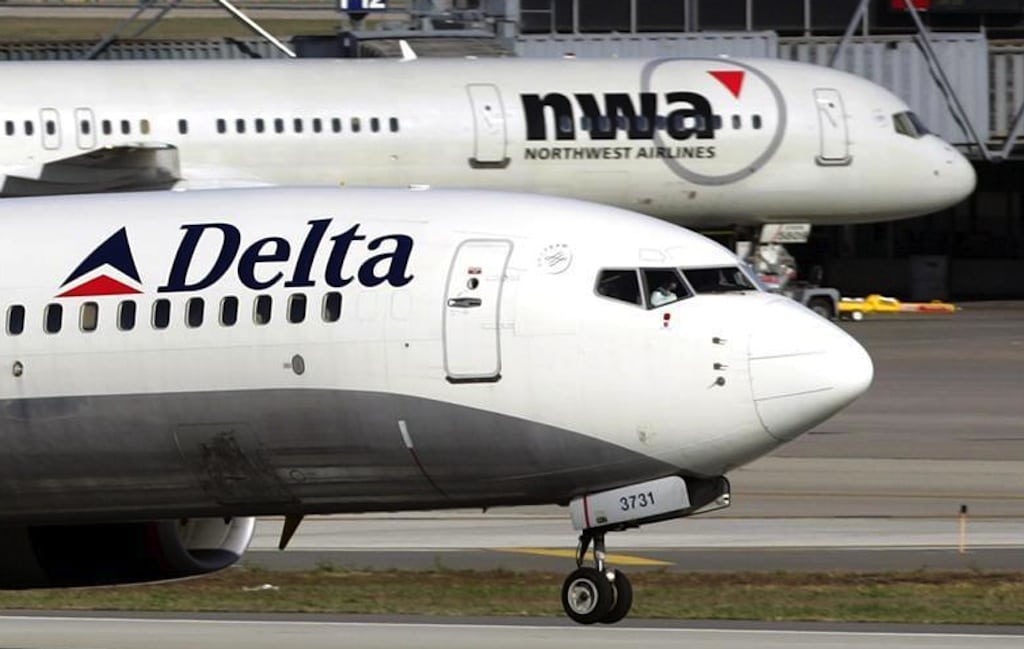Skift Take
The Justice Department lawsuit against American Airlines and US Airways, and their marriage vows, would make more sense if it was part of a more comprehensive drive to correct the negative impacts of previously approved mergers.
Here’s a question no one is asking: With the Department of Justice filing suit to stop the American Airlines-US Airways merger, why wouldn’t it go back and also review past airline mergers that it approved because the department seems to be saying that at least some of them involve a string of broken promises?
The Justice Department is charged with monitoring merger agreements to ensure that competition requirements aren’t breached so why wouldn’t the DOJ take steps to attempt to remediate what it obviously feels are airline competition transgressions?
Delta’s ‘Promises to the Contrary’
After all, in the civil suit it brought with state attorneys general to block the US Airways and American Airlines merger, the DOJ outlines the alleged broken promises made by Delta since its 2008 merger with Northwest Airlines.
“In 2008, Delta merged with Northwest Airlines,” the suit states. “Despite promises to the contrary, the combined airline reduced capacity, including significant cuts at its former hubs in Cincinnati and Memphis. US Airways’ CEO was ‘quite happy’ to see the merger and advocated for further consolidation. He explained that an industry structure of ‘five different hub and spoke airlines with who knows how many hubs across the United States . . . results in all of us fighting for the same connecting passengers over numerous hubs.’ Left unsaid was that fewer airlines meant less competition and higher fares.”
United-Continental and Southwest-AirTran
The suit isn’t as explicit about any broken promises when it comes to the United-Continental merger and the Southwest-AirTran marriage, but it does talks about their negative impacts to consumers.
“United and Continental closed their deal on October 1, 2010,” the suit states. “The combined firm has reduced capacity at nearly all of its major hubs (including Cleveland) and at many airports where the two airlines previously competed. Similarly, Southwest/AirTran has reduced service in a number of its focus cities and on many of AirTran’s former routes following its 2011 merger.”
Meanwhile, in his Wall Street Journal The Middle Seat column, Scott McCartney points to United’s rising fares in Q3 2012 compared with the same timeframe three years earlier.
“Between Chicago and Houston, the home bases of United and Continental, the average fare in the third quarter last year was 57% higher than the same period three years earlier, before those airlines merged,” the column states. “Over the same period, United’s average domestic fare was up 16%.”
In the immediate aftermath of the suit to block the new American Airlines from coming into being, many observers have asked: Why is the DOJ taking such a tough stance against American and US Airways when it let all these previous mergers go through while demanding relatively token adjustments?
And, doesn’t the DOJ playing hardball with American and US Airways at this juncture amount to an effort that’s merely too little, too late?
Many people have observed that fares have been rising, fees are setting records, and capacity and flight choices have been downsized even with American and US Airways operating as separate carriers.
But, what if this blockbuster lawsuit isn’t the last chess move?
If it weren’t, then the DOJ’s action would seem to make more sense.
The question is, though, does the DOJ, which has come under intense criticism for its perceived move to halt the airline industry from finally ensuring its long-lasting health, have the stomach to get on with the job by reining in other airlines that it believes have contradicted their competition promises?
That remains to be seen, but the political costs of doing so may just be too severe.
UPDATE: A DOJ spokesperson told Skift August 16 that the department indeed has a section that “is aware” of what’s happening in the U.S. airline industry, but the focus now on the US Airways-American Airlines merger.
The Daily Newsletter
Our daily coverage of the global travel industry. Written by editors and analysts from across Skift’s brands.
Have a confidential tip for Skift? Get in touch
Tags: american airlines, antitrust
Photo credit: Delta Air Lines jet takes off past a Northwest Airline jets parked at gates at the Minneapolis St.Paul International Airport in Minneapolis, Minnesota October 30, 2008. Eric Miller / Reuters
